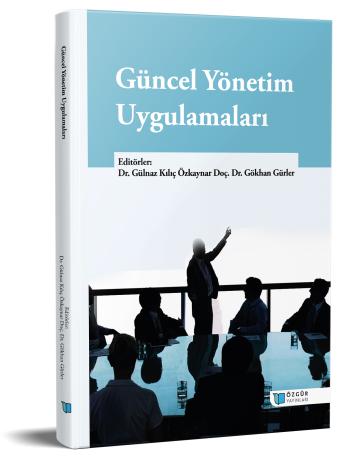
Güncel Yönetim Uygulamaları
İndir
Özet
Günümüz dünyası, hızla değişen ekonomik, teknolojik ve toplumsal dinamikler çerçevesinde yönetim uygulamalarında yeni yaklaşımları zorunlu kılmaktadır. Özellikle şeffaflık, hesap verebilirlik, dijital dönüşüm, hibrit çalışma modelleri ve kriz yönetimi gibi kavramlar, geleneksel yönetim anlayışlarının ötesine geçerek işletmelerin daha etkili ve esnek stratejiler geliştirmesini gerektirmektedir. Bu ihtiyaçlar doğrultusunda hazırlanan "Güncel Yönetim Uygulamaları" başlıklı kitabımız, hem akademik literatüre hem de yöneticilere yol gösterecek çok yönlü bir kaynak sunmayı amaçlamaktadır.
Kitap, farklı uzmanlık alanlarına sahip yazarların katkılarıyla şekillenmiştir. Dr. Şükriye Ulaşkın’ın etik yönetim, şeffaflık ve hesap verebilirlik konularındaki derinlemesine analizleri, şirketlerde daha sağlıklı bir kurumsal kültür oluşturmanın önemi üzerine yeni bakış açıları sunmaktadır. Dr. Pelin Karaca Kalkan ve Ayşegül Alev Aydın’ın stratejik yetenek yönetimi konusunda yazdıkları, yeteneklerin kuruluşlar için nasıl değer yarattığını ve bunların nasıl elde tutulabileceğini irdelemektedir.
Dr. Şerife Kuzgun’un yetkinlik ve yetenek yönetimi üzerine yeni eğilimleri ele aldığı bölüm, insan kaynakları uygulamalarının çok boyutluluğuna dikkat çekerken; Dr. Aylin İlgen’in dijital dönüşüm üzerine çalışması, teknolojinin yönetimdeki önemine vurgu yapmaktadır. Doç. Dr. Gülten Demiral ve Ayşe Esra Katrancı Altay ise sanal uygulamaların insan kaynakları yönetimindeki etkisini inceleyerek, dijital çağın çalışma modellerine olan katkısını ortaya koymaktadır.
Dr. Ebru Kasnak’ın pandemi sonrası kriz yönetimi ve esneklik üzerine yazdıkları, organizasyonların kriz anlarında nasıl çevik davranabileceğini göstermektedir. Dr. Nurdan Apaydın’ın duygusal zekâ ve empati temelli liderlik konusunda kaleme aldığı bölüm ise insani değerlerin liderlikteki önemine dikkat çekmektedir.
Dr. Ece Zeybek Yılmaz, hibrit çalışma modellerinin verimlilik ve iş-yaşam dengesi arasındaki etkisini irdelemekte; Dr. Kasım Uçtu ise geleneksel çalışma saatlerinin değişen dinamikler içindeki rolünü ele almaktadır. Son olarak, Dr. Gülnaz Kılıç Özkaynar’ın psikolojik güvenlik ve çalışan refahı üzerine yazdığı, iş yerlerinde daha sağlıklı bir çalışma ortamının önemi üzerine odaklanmaktadır.
Bu kitap, akademik ve profesyonel iş hayatının kesiştiği noktada yöneticiler, insan kaynakları uzmanları, lider adayları ve araştırmacılar için önemli bir kaynak niteliği taşımaktadır. Kitabın, yönetim alanına yönelik teorik birikim ve uygulamalı çözümler sunarak hem öğretici hem de rehber niteliğinde bir rol oynamasını diliyoruz.
Bu çalışmanın ortaya çıkmasında emeği geçen tüm yazarlarımıza teşekkür eder, okuyucularımıza faydalı olmasını temenni ederiz.

